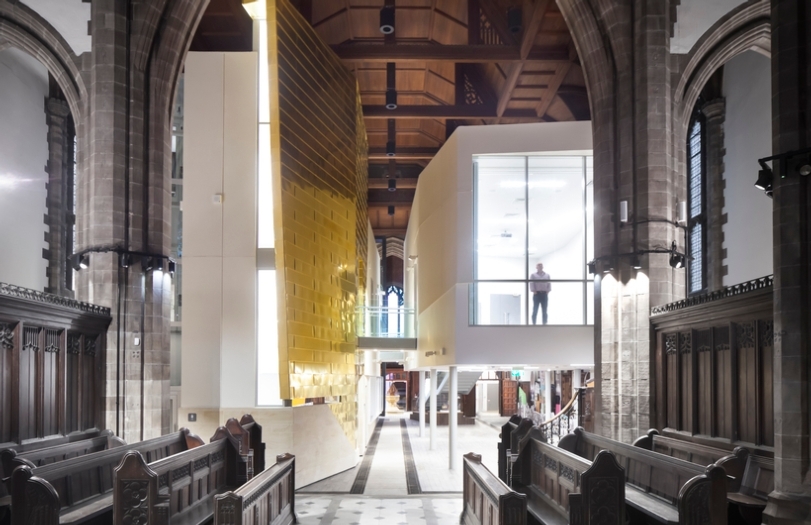All Souls Bolton reopens to public
On 6th December 2014, All Souls Bolton reopened to the public, revealing the results of a £4.9 million scheme which has been 10 years in the making. The regeneration project recently won an English Heritage Angel Award for The Best Rescue of Any Other Type of Historic Building or Site and the Churches Conservation Trust is confident that All Souls, with its dramatic new design, will be a leading example of how a modern community space fit for the 21st Century can be created within a once-neglected heritage building.
The project, funded by the Heritage Lottery Fund (HLF) with a grant of £4.3 million, as well as additional funds from the Churches Conservation Trust, English Heritage and Bolton Council, juxtaposes the original Grade II* listed Victorian architecture with two futuristic white “pods” erected inside the church, giving the building another 100 years of life by transforming it into a state-of-the-art community building for people of all faiths and none.
The church will be open from 9am – 10pm daily, with a coffee shop on the ground floor and an at-table restaurant service during peak hours. Other floors host a mix of event and tenanted office space, with a flexible main large conference room that can also be used as a dance studio or cinema thanks to the building’s music and film license. National educational charity Beanstalk is the first tenant.
Crispin Truman, Chief Executive of The Churches Conservation Trust, said: ""When an important urban church like All Souls lies unloved and in danger, we have a duty not only to save it, but also to bring it back into use at the heart of its community. This £4.9 million regeneration project is the most ambitious and innovative in the 46 year history of The Churches Conservation Trust, and I am proud that after a decade of work this beautiful Victorian building has not only been saved, but also found a sustainable purpose that will see local people coming through the doors every day.”
Carole Souter, Chief Executive of HLF said: “As the main funder of this innovative regeneration project we’re delighted to see how effectively an unused church like All Souls has been transformed into a state-of-the-art facility for a wealth of community activities. It’s a great example of how, with creative thought and strong partnerships, a much loved historic building can be reinvigorated and turned into something that serves the needs of those who live around it.”
For the first time ever, visitors will be able to get up and close with the historic interior of the church via high level walkways designed to celebrate its architectural features. The new design, by Manchester’s OMI Architect’s will allow visitors to get much closer to the windows, war memorials and amazing timber roof of the church.
Nick Berry, OMI architects said: “The form making in the new design is not arbitrary, but has connections with both the church and is local environs. The pods are rooted in a careful consideration of the building and its surroundings, and its link to the original ‘urban grain.’ The new design is also faithful to the church’s original pillar free design - the pods are set back from the church entrance and their design enables an entirely unobstructed view of the church’s east end ensuring uninterrupted views of the chapel and choir.”
A typical example of the 200 urban churches featured on English Heritage’s at Risk Register, All Souls Bolton stood neglected, closed and facing a £1.5 million repair bill. Only 2-3 people a year were visiting and it was a symbol of the decline of Bolton, until local resident and All Souls Bolton Chair, Inayat Omarji, worked with The Churches Conservation Trust to change its fortune.
Inayat Omarji, Chair of All Souls Bolton, said: “We wanted to make the building useful to every person in the community and sustainable in the long term. Not only will the space be partially used as a future centre for heritage learning. There will be films exploring local history on interactive screens and a ‘history wall’ of community mementos and artefacts, and the building site itself has even been a location for teaching and promoting traditional heritage craft to members of the local community.”
Throughout the construction programme, the National Heritage Training Group funded six paid training placements to local Bolton residents, on top of a series of free technical days for the general public, which focused on key heritage conservation skills.
Three of those who took part in training places are now undertaking formal apprenticeships in stone masonry. This unique scheme is the latest innovative heritage regeneration project from our Regeneration Taskforce, and follows on from the success of St Pauls Church, Bristol's partnership with Circomedia.
The next major project due for completion is the transformation of St Mary at the Quay, Ipswich into a wellbeing heritage centre in partnership with Suffolk Mind and the Heritage Lottery Fund, which is due to be completed in early 2016.
- Read about All Souls Bolton in the Observer
- Visit the All Souls Bolton website
- Visit the All Souls Bolton project page

